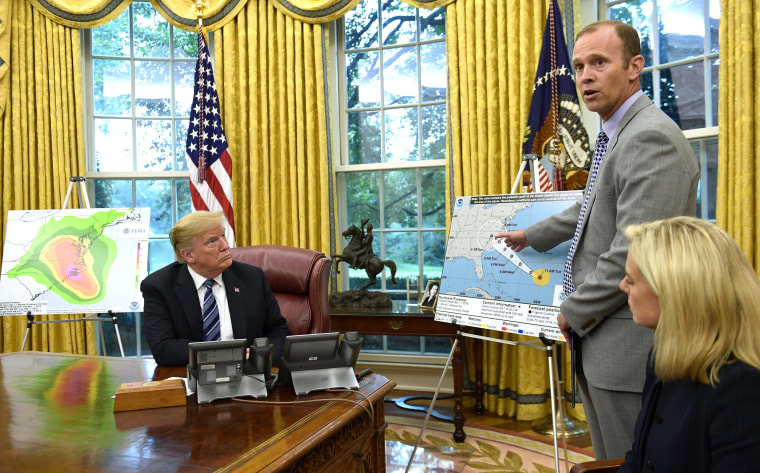WASHINGTON — It was a brutal summer for President Trump. Helsinki. Family separations at the border. Michael Cohen’s guilty plea. Paul Manafort found guilty. The president’s reaction to John McCain’s death. His absence from the funeral ceremonies. The Woodward book. The Anonymous op-ed.
And that brutal summer is reflected in the post-Labor Day polling: CNN, Gallup and Quinnipiac showed the president’s job rating at 40 percent or below, while Quinnipiac this morning has Democrats leading on the generic ballot by 14 points. That’s “Danger, Will Robinson, Danger” territory for Republicans with less than two months before the midterm elections.
Which is all why the next 72 hours — and likely longer — are an important moment for Trump and the GOP. As Hurricane Florence barrels toward the Carolinas, American politics will take a pause. Discussions about Woodward, Anonymous and the latest developments in the 2018 midterms will get pushed to the side. And it’s very possible the story about Florence, its cleanup and recovery play out for weeks and months ahead.
But Trump can’t put politics — and grievances — aside
Of course, that doesn’t mean that President Trump will hit the pause button himself. Here’s what he tweeted this morning:
“We got A Pluses for our recent hurricane work in Texas and Florida (and did an unappreciated great job in Puerto Rico, even though an inaccessible island with very poor electricity and a totally incompetent Mayor of San Juan). We are ready for the big one that is coming!”
The day after remembering 3,000 Americans who died on 9/11, the president is calling another moment when another 3,000 Americans died “an unappreciated great job.” The president is unwilling — or incapable — of taking a pause himself.
First Read’s Top 10 Senate takeovers
After the Labor Day break and after a slew of new polls, we’ve updated our Top 10 Senate takeover list – based on the likelihood of the seat flipping parties. The first three races here are *slight* advantages for the challenger party. The next three are true 50-50 races or very close to it. And the final four are where the incumbent party has the *slight* advantage. An important note: These rankings are based on where we see these races RIGHT NOW, and not based on what we think will happen two months from now.
1. Nevada (R): Yes, yesterday’s Suffolk poll showed an essentially tied race between incumbent Sen. Dean Heller, R-Nev., and Democratic challenger Jacky Rosen. But when an incumbent is at 41 percent, he’s in big, big trouble (Previous ranking from May: 1)
2. Arizona (R-open): Since the August primary, this has turned into the nastiest Senate race in the country, with Republicans and GOP nominee Marth McSally unloading all of their ammunition at Democrat Kyrsten Sinema. Will it work? (Previous ranking from May: 2)
3. North Dakota (D): There’s been very little polling in this very small state since June, when Mason-Dixon found Republican Kevin Cramer leading Sen. Heidi Heitkamp by 4 points, 48 percent to 44 percent. We’ll give the GOP the benefit of the doubt – for now. (Previous ranking from May: 3)
4. Missouri (D): As our NBC/Marist poll showed, this is a true 50-50 race. And when third-party candidates are introduced to the mix, you see that incumbent Sen. Claire McCaskill doesn’t need 50 percent to win. (Previous ranking from May: 5)
5. Florida (D): The most recent Quinnipiac poll of this race also feels right – a tied race between incumbent Sen. Bill Nelson, D-Fla., and term-limited Republican Gov. Rick Scott. And as one of us noted yesterday, ad spending since the primary is now even. (Previous ranking from May: 8)
6. Tennessee (R-open): This is also close to a 50-50 race: Dem Phil Bredesen 48 percent, Republican Marsha Blackburn 46 percent, per last week’s NBC/Marist poll – in a state Trump won by 26 points in 2016. (Previous ranking from May: 4)
7. Indiana (D): Now we’re getting outside the 50-50 zone, with Sen. Joe Donnelly, D-Ind., ahead in our NBC/Marist poll, though within the margin of error. (Previous ranking from May: 6)
8. Montana (D): Republicans are increasingly bullish on their chances against Sen. Jon Tester, D-Mont. But in this political environment? Even in Montana? (Previous ranking from May: 10)
9. West Virginia (D): You know the Senate map has changed when this race almost doesn’t make our Top 10. GOP primary voters nominating Patrick Morrisey – and not Evan Jenkins – to face incumbent Sen. Joe Manchin, D-W.V., might end up being one of the most consequential primary outcomes of the 2018 primary season. (Previous ranking from May: 7)
10. Texas (R): Texas — yes, Texas — is the final takeover opportunity on our Top 10 list. The other possibility here was Wisconsin. But ask yourself: Which party is sending in the cavalry to help an incumbent – Democrats trying to rescue Tammy Baldwin, or Republicans trying to rescue Ted Cruz? And the answer is why Texas makes this list. (Previous ranking from May: unranked)
Other races to watch (in alphabetical order): Minnesota, Mississippi, New Jersey, Wisconsin.
Breaking down New Hampshire’s primary results from last night
In New Hampshire’s primaries last night, Democrat Chris Pappas beat Maura Sullivan and a slew of others in NH-1 (Bernie Sanders’ son, Levi Sanders, was in seventh place), and he’ll face Republican Eddie Edwards in the general election. As NBC’s Alex Seitz-Wald notes, Pappas would become New Hampshire’s first openly LGBT member of Congress, if he’s elected. And Edwards would be the state’s first African-American congressman if he wins.
Meanwhile, former state Sen. Molly Kelly won the Democratic gubernatorial primary last night, and she’ll face incumbent Republican Gov. Chris Sununu in November.
And it’s a rare Primary Wednesday — in Rhode Island
Finally, incumbent Dem Gov. Gina Raimondo is getting a challenge today from the left from former secretary of state Matt Brown. The likely GOP nominee will be Allan Fung, who lost to Raimondo in 2014.
